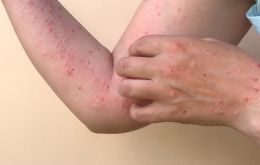MercoPress. South Atlantic News Agency
Health & Science
-
Friday, August 26th 2022 - 09:55 UTC
Paraguay: First case of monkeypox confirmed

Paraguayan health authorities Thursday confirmed the first case of monkeypox in the South American country. It was an adult male patient of Paraguayan nationality with a travel history, it was reported. Meanwhile, 17 suspected cases were ruled out.
-
Thursday, August 25th 2022 - 10:01 UTC
11-yr-old girl among confirmed cases of monkeypox in Bolivia

Bolivian health authorities Wednesday announced that an 11-year-old girl in the department of Cochabamba was among the 49 confirmed cases in the country of monkeypox, a malady that usually affects male adults.
-
Wednesday, August 24th 2022 - 21:10 UTC
Uruguay stops requesting Covid-19 affidavit at its borders

Uruguayan authorities have announced they would no longer require affidavits from incoming travelers attesting to their health covid-19-wise, in addition to granting tax exemptions on hotel and restaurant bills to foreign visitors, effective as of next month.
-
Wednesday, August 24th 2022 - 10:10 UTC
Patients with monkeypox die in Cuba, Mexico

Cuba and Mexico have joined the list of countries such as Brazil, Peru, and Spain, where people with monkeypox have died, it was reported Tuesday. Worldwide, there have been 41,664 cases and 12 deaths.
-
Tuesday, August 23rd 2022 - 18:51 UTC
Third case of monkeypox confirmed in Uruguay

Uruguayan health authorities have confirmed a third monkeypox infection had been detected in the country after 38 suspected cases were ruled out.
-
Tuesday, August 23rd 2022 - 09:54 UTC
RRS Attenborough calls at Belfast to pick up a new crew before further scientific research

After a long season in Antarctica, Falkland Islands' flagged exploration ship RRS Sir David Attenborough has docked in Belfast for the first time, to pick up new crew members ahead of carrying out further scientific studies around the UK coastline. The state of the art vessel is owned by the Natural Environment Research Council and operated by the British Antarctic Survey.
-
Tuesday, August 23rd 2022 - 09:35 UTC
Monkeypox awareness campaign launched in Brazil

Brazil's Health Ministry Monday launched an awareness campaign on monkeypox, to inform the population about transmission, contagion, and symptoms of the malady.
-
Monday, August 22nd 2022 - 17:26 UTC
First Cuban case of monkeypox almost fatal, still serious

Cuban authorities have confirmed during the weekend the first case of monkeypox in the country. It was a 38-year-old Italian tourist who was reported to be in serious condition, according to Granma.
-
Monday, August 22nd 2022 - 09:36 UTC
Paraguayans skipping booster doses of COVID-19 vaccine

Paraguayan health authorities have expressed their concern over a slowdown in vaccination against COVID-19, with very few booster doses applied.
-
Saturday, August 20th 2022 - 09:54 UTC
Pfizer files for emergency clearance of bivalent C-19 vax in Brazil

Brazil's National Health Surveillance Agency (Anvisa) has received a request for the emergency use of Pfizer's newest vaccine against COVID-19 which would be active against both the original and the Ômicron strain, subvariant BA.1.